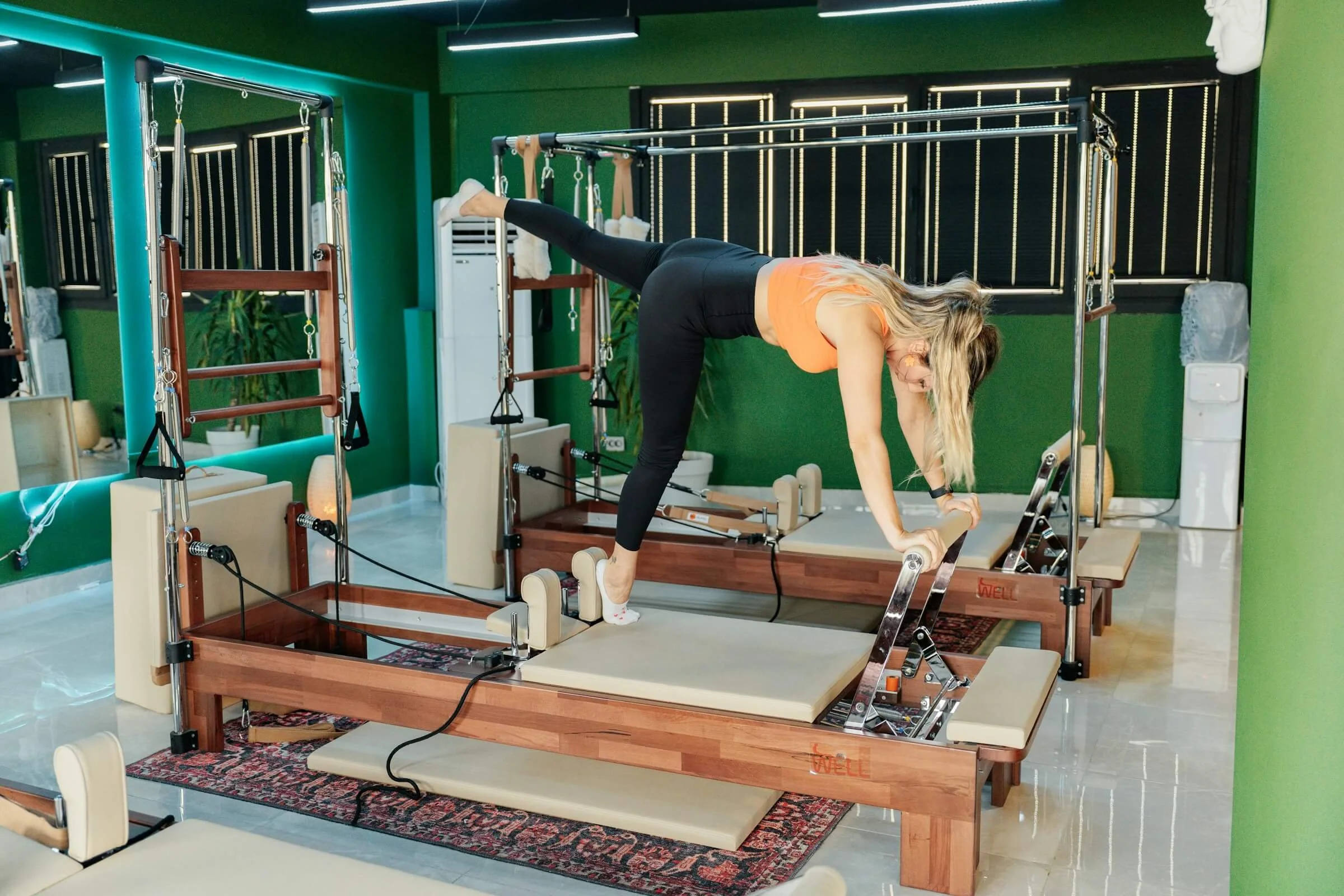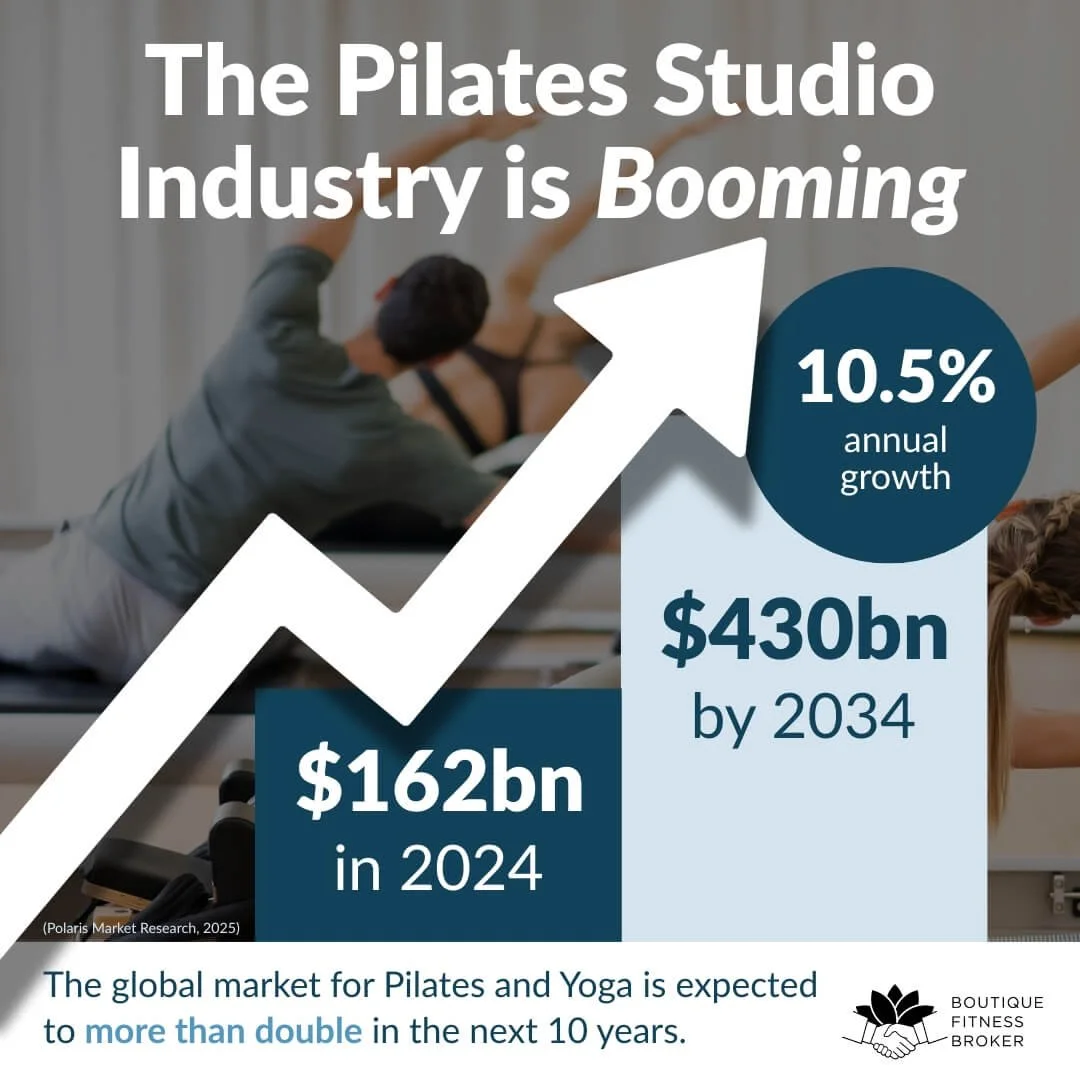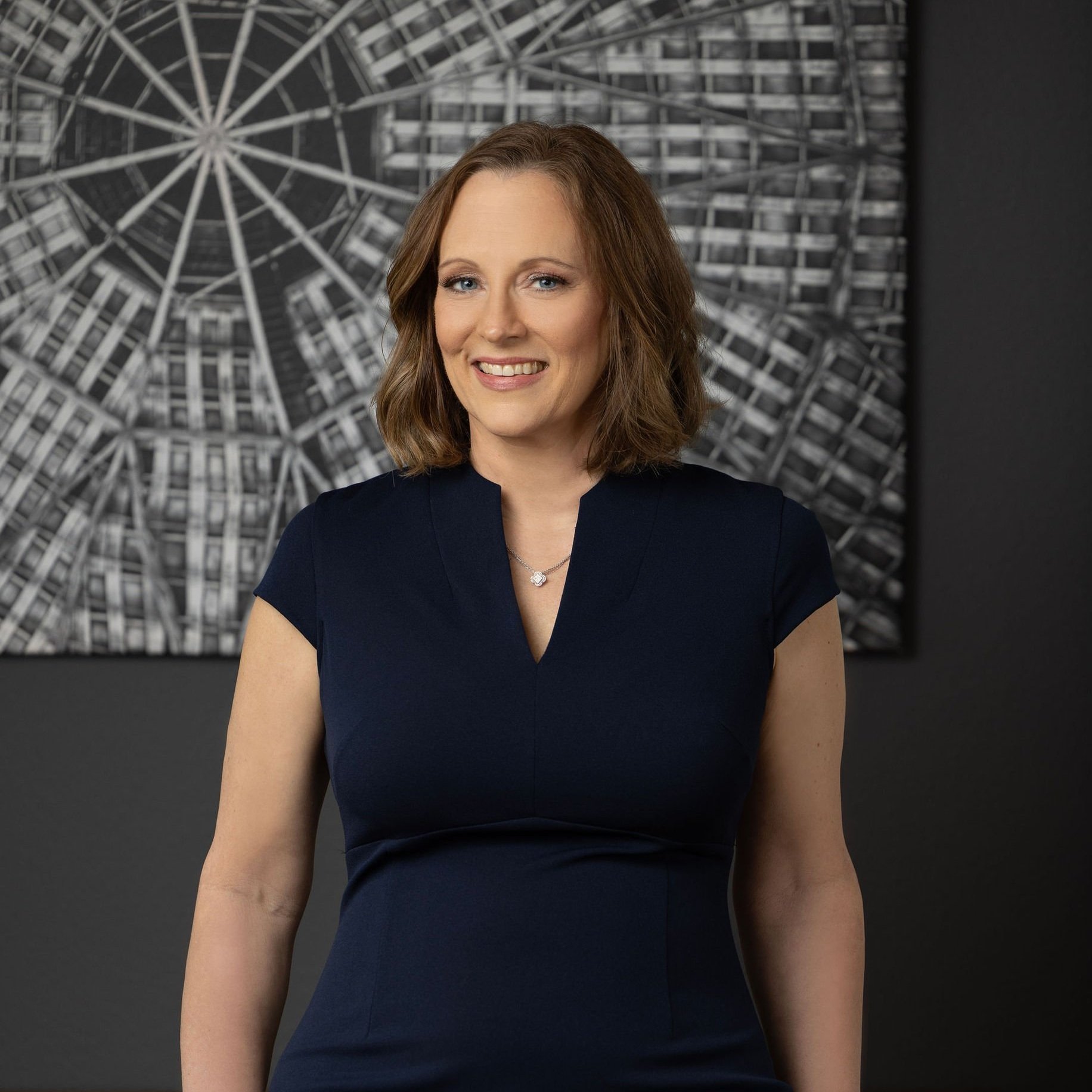
Sell a Pilates Studio
You’ve built a Pilates studio that’s strong, balanced, and thriving. Now you’re ready for your next adventure.
Whether that’s another business, more travel, or just more time for you, we’ll help you get there.
Selling your Pilates studio is a big decision. Boutique Fitness Broker is here to help you do it thoughtfully.
We specialize in selling Pilates studios to the right buyers who value your hard work and want to carry it forward. From pricing to paperwork, we handle it all, so you can focus on what’s next.
Celebrate what you’ve built.
Step into what’s next.
Why Is Now the Right Time to Sell a Pilates Studio?
Pilates isn’t just trending. It’s growing fast. More people are turning to low-impact, core-focused, and rehabilitative fitness. And Pilates is leading the charge.
The global Pilates and yoga studio market is projected to grow from $162 billion in 2024 to over $430 billion by 2034, with an annual growth rate of 10.5% (Polaris Market Research, 2025).
And in the U.S., Pilates was just named the most-booked workout on ClassPass for the second year in a row, with bookings up 84% since 2023 (Athletech News, 2024).
This rise in demand translates into:
Higher business valuations
A larger pool of buyers
Stronger leverage when you negotiate
Whether your studio runs group Reformer classes or private sessions, serious buyers are looking to carry on your legacy, which is perfect if you’re ready to retire, pursue a new venture, or simply step back while your business continues to thrive.
What Makes a Pilates Business Valuable?
Studios with recurring revenue, low owner dependency, and clean financials tend to sell faster and for more money. But Pilates studios also bring unique value drivers. Sharpening up these areas of your business can help you stand out and earn more from your sale.
Get your free estimated valuation.
Brand Reputation
Pilates clients are loyal, discerning, and highly attuned to consistency. Studios that preserve instructor-client relationships and keep class schedules consistent during a transition tend to see smoother handoffs and stronger long-term outcomes.
Instructor Team
Certified Pilates instructors are hard to find and harder to keep. Their relationships with clients are gold. If you have a loyal, well-trained team, it’s one of your biggest selling points. Studios with strong staff retention and minimal reliance on the owner attract instructor-buyers ready to step into a well-oiled operation.
Pilates Method
Your studio’s identity (Classical, Contemporary, or Hybrid) shapes your buyer pool. Classical studios often appeal to purist instructors. Contemporary methods may attract a wider fitness audience. A clearly defined teaching style and brand voice give buyers confidence.
Financial Health
Strong SDE (Seller's Discretionary Earnings), clean books, and predictable income streams (like recurring memberships) are non-negotiables for serious buyers. If your finances are organized and your margins are healthy, you’ll have more leverage and likely a faster, smoother deal.
Pilates Equipment
Reformers, Cadillacs, chairs, and barrels aren’t just props. They’re high-value assets that directly impact your valuation. Buyers will factor in equipment quality, quantity, and maintenance history when evaluating your studio.
Studio Location and Lease
Pilates equipment requires space. Square footage, ceiling height, and zoning can make or break a deal. A favorable lease and responsive landlord? That’s a major plus.

Curious What Your Pilates Studio Might Be Worth?
30 Minutes of Free Advice Now can add Six Figures When you Sell
The Steps to Selling a Pilates Studio
Selling a Pilates studio follows many of the same milestones as selling any boutique fitness business, but the details make the difference. From specialized equipment to your instructor team, buyers will look closely at what makes your studio stand out. Here’s what to expect:
0. Exit Planning
Before listing, you’ll prepare your studio to be as turnkey as possible for the next owner. That means clean, accurate financials, a full inventory of your Reformers, Cadillacs, chairs, and barrels with serial numbers and maintenance logs, and systems that keep classes running smoothly without you.
1. Valuation
Your asking price is shaped by more than revenue. Buyers weigh your financial performance, lease terms, and operational health alongside Pilates-specific assets, like a matching set of Merrithew Reformers, a strong base of recurring memberships, or a well-regarded instructor training program.
2. Listing
The strongest buyers often come from within the Pilates community: certified instructors, experienced fitness professionals, or multi-studio owners who already understand the business model. Our confidential listing allows you to strategically showcase your studio’s most valuable assets with our network of qualified, vetted buyers. Explore our Pilates studio listings.
3. Negotiation
We help you compare offers side-by-side. When offers come in, it’s not just about price. Terms such as the length of a training period, agreements to retain staff, or maintaining existing class schedules can be just as important. The Pilates world is tight-knit, so knowing what buyers value most helps you shape an offer that works for everyone.
4. Escrow
Once terms are agreed, buyers move into due diligence. They’ll verify your financial records, inspect equipment, review maintenance logs, and confirm lease transfer details. Being organized here, with clear systems and up-to-date records, can keep the process moving quickly.
5. Closing
The sale wraps up with final paperwork, account transfers, and any agreed-upon training for the new owner. In Pilates sales, it’s common to have a short shadowing period to reassure both the instructors and the clientele that the studio’s culture and quality will continue.
Want more details on each step?
Explore the full roadmap to selling a boutique fitness business.
Why Work With Boutique Fitness Broker?
A broker can help Pilates studio owners get more from their exit, without the stress and confusion. At Boutique Fitness Broker, we’re not generalists. We’re former studio owners, and we know the boutique fitness space inside and out.
Unlike general business brokers, we know what a loyal Reformer client is worth, how to talk to instructor-buyers, and what buyer red flags to avoid. Over the past five years, we’ve helped sell 60+ studios and closed more than $10 million in deals in 2024 alone.
At Boutique Fitness Broker, we:
Have been in your shoes and know how overwhelming selling can feel
Understand Pilates operations, instructor dynamics, and studio culture
Know what today’s buyers are looking for (and what scares them off)
Keep your sale confidential, strategic, and focused on your goals
Whether your priorities are top-dollar, legacy, timeline, or all three, we’ll help you get there. Learn more about Boutique Fitness Broker.
Mitch McGinley, Founder + CEO
Kristin Abel, President
FAQs
-
Most Pilates studios sell within 6–18 months. The biggest time-savers? Clean, organized financials, up-to-date tax returns, documented equipment lists, and a team that can run the day-to-day without you. The more “turnkey” your studio looks to a buyer, the faster the deal tends to close.
-
That’s perfectly fine. Many owners start talking to us 12–24 months before they list. Early planning means you can fix red flags, shore up financials, and lock in the operational stability that attracts top-dollar buyers. Even if you’re a few years out, a quick conversation now can save you months later.
-
Two things: One, how emotional it can be to hand over something you’ve built. And two, that serious buyers look at Seller’s Discretionary Earnings (SDE) more than total revenue. A smaller studio with healthy profit margins often sells faster (and for more) than a bigger studio with slim margins. Add in clean books and well-run systems, and your offers will go up.
-
Buyers range from certified Pilates instructors ready to own, to multi-studio operators expanding into new markets, to local entrepreneurs passionate about health and fitness. All are seeking a well-run, profitable studio they can step into with minimal disruption to clients, staff, and day-to-day operations from the transition.



